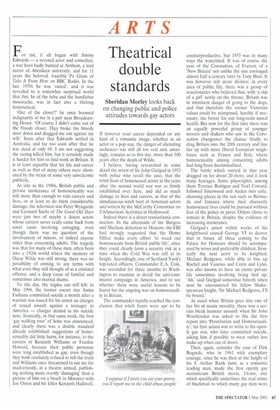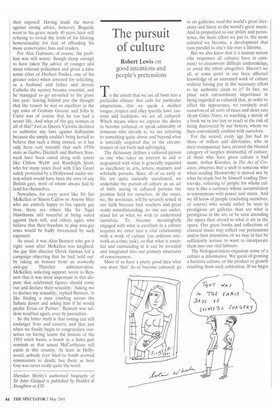Theatrical double standards
Sheridan Morley looks back on changing public and police attitudes towards gay actors
For me, it all began with Jimmy Edwards — a revered actor and comedian, a war hero badly burned at Arnhem, a lord rector of Aberdeen university, and for 11 years the beloved, irascible Pa Glum of Take It From Here on BBC Radio. In the late 1970s he was couted', and it was revealed to a somewhat surprised world that Jim, he of the tuba and the handlebar moustache, was in fact also a lifelong homosexual.
'Out of the closet?' he once boomed indignantly at me in a pub near Broadcasting House. 'Of course I didn't come out of the bloody closet. They broke the bloody door down and dragged me out against my will.' Soon after that Edwards settled in Australia, and far too soon after that he was dead at only 68. I am not suggesting the outing killed him, but it certainly made it harder for him to find work in Britain. It is at least arguable that his life and career as well as that of many others were shortened by the strain of some very unwelcome publicity.
As late as the 1980s, British public and private intolerance of homosexuality was still more than enough to ruin careers and lives, or at least to do them considerable damage; the television star Peter Wyngarde and Leonard Sachs of The Good Old Days were just two of maybe a dozen actors whose careers never really came back from court cases involving cottaging, even though there was no question of the involvement of minors, or indeed anyone other than consenting adults. The tragedy was that for many of these men, often born into a 1920s world where the memory of Oscar Wilde was still strong, there was no possibility of coming to any terms with what even they still thought of as a criminal offence, and a deep cause of familial and sometimes also marital shame.
To this day, the stigma can still kill: in May 1998, the former soccer star Justin Fashanu committed suicide a month after a warrant was issued for his arrest on charges of sexual assault against a teenager in America — charges denied in his suicide note. Ironically, in that same week, the first 'gay walking tour' of Soho was announced, and clearly there was a double standard already established; suggestions of homosexuality did little harm, for instance, to the careers of Kenneth Williams or Frankie Howerd, because their public personae were long established as gay, even though they both resolutely refused to tell the truth and Williams once threatened to sue me for inadvertently, in a theatre annual, publishing nothing more overtly 'damaging' than a picture of him on a beach in Morocco with Joe Orton and his killer Kenneth Halliwell. If however your career depended on any kind of a romantic image, whether as an actor or a pop star, the danger of alienating audiences was still all too real and, amazingly, remains so to this day, more than 100 years after the death of Wilde.
I believe, having researched in some detail the arrest of Sir John Gielgud in 1953 with police who recall the case, that the witch hunt of homosexual actors in the years after the second world war was as firmly established over here, and did as much damage to lives and careers, as that of the simultaneous witch hunt of American actors and writers by the McCarthy Committee on UnAmerican Activities in Hollywood.
Indeed there is a direct transatlantic connection. In the aftermath of the Burgess and Maclean defection to Moscow, the FBI had strongly requested that the Home Office make every effort 'to weed out homosexuals from British public life', since they could clearly form a security risk at a time when the Cold War was still at its height. Accordingly, one of Scotland Yard's top-rated officers, Commander E.A. Cole, was seconded for three months to Washington to examine in detail the anti-communist campaign in America, and to see whether there were useful lessons to be learnt for the ongoing war on homosexuality in Britain.
The commander rapidly reached the conclusion that witch hunts were apt to be
counterproductive. but 1953 was in many ways the watershed. It was of course the year of the Coronation, of Everest, of a 'New Britain' not unlike the one envisaged almost half a century later by Tony Blair. It was however still more divisive; in every area of public life, there was a group of reactionaries who believed that, with 'a slip of a girl' newly on the throne, Britain was in imminent danger of going to the dogs, and that therefore the sooner Victorian values could he reimposed, harshly if necessary, the better for our long-term moral health. But now for the first time there was an equally powerful group of younger movers and shakers who saw in the Coronation changeover the chance finally to drag Britain into the 20th century and line her up with more liberal European neighbours such as France and Italy, where homosexuality among consenting adults had long been decriminalised.
The battle which started in that year dragged on for about 20 more, and it took many hostages. Some playwrights, among them Terence Rattigan and Noel Coward, followed Isherwood and Auden into exile, choosing places in the sun such as Bermuda and Jamaica where their discreetly homosexual lives could be pursued without fear of the police or press. Others chose to remain in Britain, despite the evidence of increasing intolerance.
Gielgud's arrest within weeks of his knighthood caused George VI to decree that in future all those coming to the Palace for Honours should be accompanied by wives and preferably children. Ironically the next actor to be knighted, Michael Redgrave, while able to line up Rachel and Vanessa and Corin and Lynn, was also known to have an exotic private life sometimes involving being tied up. `Ah,' said Gielgud somewhat bitterly when next he encountered his fellow Shakespearean knight, 'Sir Michael Redgrave, be bound.'
As usual when Britain goes into one of her fits of manic morality, there was a certain bleak humour around: when Sir John Woolfenclen was asked to file the first report into 'Prostitution and Homosexuality', his first action was to write to his openly gay son, who later committed suicide, asking him if possible to wear rather less make-up when out of doors.
Then, again, consider the case of Dirk Bogarde, who in 1961 with exemplary courage, since he was then at the height of his J. Arthur Rank fame as a romantic leading man, made the first openly gay mainstream British movie. Victim, one which specifically underlines the real crime of blackmail to which many gay men were then exposed. Having made the movie against strong advice, however, Bogarde went to his grave nearly 40 years later still refusing to reveal the truth of his lifelong homosexuality for fear of offending his more conservative fans and readers.
For Alec Guinness, of course, the problem was still worse; though sharp enough to have taken the advice of younger and more tolerant policemen and given a false name (that of Herbert Pocket, one of his greater roles) when arrested for soliciting, as a husband and father and devout Catholic the secrecy became essential, and he managed to go un-outed to his grave last year, leaving behind just the thought that the reason he was so excellent in the spy roles of Graham Greene and John le Cane was of course that he too had a secret life. And what of the gay women in all of this? Just as Queen Victoria declined to authorise any laws against lesbianism because she simply couldn't bring herself to believe that such a thing existed, so it has only been very recently that such 1930s stars as Garbo, Dietrich and Barbara Stanwyck have been outed along with actors like Clifton Webb and Randolph Scott, who for many years lived with Cary Grant safely protected by a Hollywood studio system which would have been the envy of any British gays, most of whom always had to fend for themselves.
Nowadays, for every actor like Sir Ian McKellen or Simon Callow or Antony Sher who are entirely happy to live openly gay lives, there are others like Sir Nigel Hawthorne still resentful at being outed against their will, and others again who believe that their freedom to play non-gay roles would be badly threatened by such exposure.
As usual, it was Alan Bennett who got it right: soon after McKellen was knighted, the gay film director Derek Jarman led a campaign objecting that he had 'sold out' by taking an honour from an avowedly anti-gay Thatcher administration. McKellen, soliciting support, wrote to Bennett that it was most important in this dispute that celebrated figures should come out and declare their sexuality; 'Asking me to declare my sexuality,' replied Bennett, 'is like finding a man crawling across the Sahara desert and asking him if he would prefer Evian or Perrier.' Bennett was seldom troubled again, even by journalists.
So the bitter truth is that outing can still endanger lives and careers, and that just when we finally begin to congratulate ourselves on having learnt the lessons of the 1953 witch hunts, a bomb in a Soho pub reminds us that sexual McCarthyism still exists in this country. At least in Hollywood, nobody ever tried to bomb avowed communists to death; but there as here Gay was never really quite the word.
Sheridan Morley's authorised biography of Sir John Gielgud is published by Hodder & Stoughton at 120,











































































 Previous page
Previous page